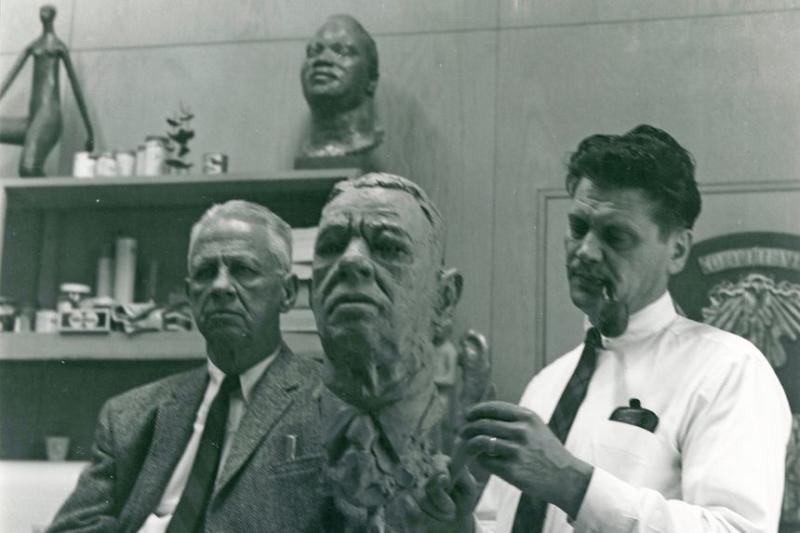'Heaven Can Indeed Fall' Review: Willmoore Kendall's Conservatism
By: Barton Swaim (WSJ)



The amazing thing about the American conservative movement in the second half of the 20th century is that it happened at all. The 1950s are thought of now as "conservative" because they were years of broad consensus on cultural matters, but the intellectual premises of liberalism dominated midcentury political life. Indeed in 1955, when a 29-year-old William F. Buckley Jr. founded National Review magazine, American conservatism was all but dead. The GOP's isolationism had been discredited by the war, Keynesian economics reigned nearly unchallenged, liberal Protestantism appeared to offer a stabilizing social force, and Republicans had reconciled themselves to the New Deal and its legacy of centralization and bureaucratic control. There was, in short, very little demand for a new form of conservatism. Such a thing had to be made, or remade.
Among the figures who carried out that remaking, Willmoore Kendall Jr. (1909-67) is probably the least appreciated. Beginning in 1947, Kendall taught political philosophy at Yale. There he mentored Buckley and the Catholic activist and intellectual L. Brent Bozell Jr. (the movement bristled with juniors, it would seem) and urged both to publish a sympathetic but clear-eyed assessment of the man liberals loved to hate, Sen. Joseph McCarthy. The book, "McCarthy and His Enemies" (1954), was widely ridiculed in the press but set a valuable example for probing the reasons for populist revolts, however ugly.
Kendall took a substantial role as columnist and editor in the early years of National Review. From 1950 until his death he published many scholarly essays on the nature of conservatism, the best of them appearing in the posthumously published “Willmoore Kendall Contra Mundum” (1971), edited by his third wife, Nellie D. Kendall. One idea appears again and again in those essays: that no nation can manage for long without some form of censorship; without, in other words, the ability to exclude ideas and language it deems to be evil or disloyal. The 1994 reprint of “Contra Mundum,” for instance, includes a sizzling attack on the free-speech absolutism of J.S. Mill’s “On Liberty” and Karl Popper’s “The Open Society.” “In order to practice tolerance on behalf of the pursuit of truth,” Kendall writes, “you have first to value and believe in not merely the pursuit of truth but Truth itself.” That the 21st-century left has embraced the spirit of Kendall’s critique, albeit while nonsensically denying the existence of ultimate Truth—even as influential parts of the right cling to Mill’s conception of nations as debating clubs—is one of the strange ironies of our time.
“Heaven Can Indeed Fall: The Life of Willmoore Kendall,” by Christopher H. Owen, a professor of history at Northeastern State University in Oklahoma, is the first book-length biography of the man. Kendall was the son of a blind Oklahoma Methodist minister. Willmoore Sr. taught his son to read widely and speak with force. The two argued ferociously about politics and religion and everything else until Willmoore Jr. left for college. As a student in Oxford—he was a Rhodes scholar—he studied under the philosopher R.G. Collingwood. (The letters between father and son while the latter lived in England, published in 1993 under the title “Oxford Years,” are by turns uproarious and moving and ought to be better known. The book has no index, however—unforgivable.)
In the late 1930s Kendall taught political philosophy at Louisiana State University—a remarkable fact inasmuch as he then considered himself, variously, a Marxist, a Trotskyist and a communist. There he began close friendships with the literary critics Robert Penn Warren and Cleanth Brooks. Later, living in Chicago while he finished his University of Illinois doctoral dissertation, he hung about with Saul Bellow.
As a young man he seems sincerely to have believed that communist views could cohere with loyalty and patriotism. When he realized so many communists wished America ill—so I read Mr. Owen’s narrative—Kendall began his move to the right. In any case, his detachment from leftist ideologies began during World War II, when he worked as a propagandist for U.S. intelligence agencies in Latin America (he spoke Spanish fluently).
Kendall had a wonderful talent for making friends and none for keeping them. His superb gifts as a teacher were matched by his talent for alienating colleagues. Buckley’s 1999 novel “Redhunter,” about the rise and fall of Sen. Joe McCarthy, includes a portrait of Kendall—Professor Willmoore Sherrill—who “was renowned for his ability to infuriate his colleagues and to engross his seminar students.” In 1939, LSU, responding to faculty demanding his dismissal, declined to renew his contract. In 1961 Yale paid him a sizable sum to leave. His first marriage ended amicably, his second disastrously, the professor finding it difficult to keep his hands off ladies to whom he wasn’t married.
Kendall, particularly in his later years, when alcohol intermittently got the best of him, seemed to search out ways to offend and take offense. He managed to alienate his once devoted student Buckley by constantly complaining about editorial positions taken by National Review, among them its support for Barry Goldwater. In 1963, piqued that the magazine wouldn’t run a pro bono advertisement for the University of Dallas, with which Kendall was then associated, he wrote to Bill Rusher, the magazine’s publisher, that he felt about NR “much as I would about an ex-wife of mine who’d become a call-girl.” Buckley finally exploded in a letter in which he remarked that, as for “wives and call-girls, I can only welcome the news that you have finally learned to distinguish between the two.”
“Heaven Can Indeed Fall” could have used a firmer editorial hand. Mr. Owen’s attempts to answer the obvious question—do we need a scrupulously sourced biography of a man almost no one today has heard of?—are not convincing. The book’s conclusion, on how Kendall’s friend Carl Albert, whom he knew in England, had become speaker of the U.S. House and embodied Kendall’s ideas on localism, is to my mind completely baffling. Mr. Owen, moreover, shows minimal appreciation for the best thing about his subject’s writing: its style. He refers off-handedly to Kendall’s “often convoluted prose” and quotes sympathetically the conservative historian Richard Weaver’s admonition to Kendall that his prose too often involved a “relentless logical progression” and was “too rigorous.” Which, if you’ve ever read Weaver, is rich.
It’s true that Kendall’s prose is not always easy to follow—it combines windy urbanity with a folksy Oklahoma wit—but there is a warmth and a charm in it that urges you to keep up. It is sui generis. The American right, after all, didn’t rattle midcentury liberalism only by rigor and logical progression. It did so, like a professor engrossing seminar students, by its style.
Mr. Swaim is an editorial-page writer for the Journal.



You just got to love that line:
"Buckley finally exploded in a letter in which he remarked that, as for “wives and call-girls, I can only welcome the news that you have finally learned to distinguish between the two.”
Kendall's Conservatism? And how many Conservatives do we know that were registered democrats all their lives?
The Book is:
Heaven Can Indeed Fall: The Life of Willmoore Kendall
By Christopher H. Owen
Lexington
256 pages
The only thing I find interesting about Willmoore Kendall is his weird first name.
But did you read the book?
Why would I do that?